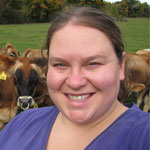
That’s the first secret I ever shared through my Secrets of Ag project. I didn’t write it, but I could have. If I’m being completely honest with you, I’ve had this thought more than once. And for one extremely terrifying moment in my life, it was more than just a thought.
September is Suicide Prevention Month. And I unfortunately believe that farmers’ lives are too hard not to talk about this. I also believe that we have been set an impossible standard to live by, unconsciously. Let me explain.
When most people think of a farmer, they basically think of John Wayne. Tough. Weathered. A guy who has seen it all and lived through it all. He can solve any problem and doesn’t need help to do it. He never needs a day off because he loves what he does and never gets sick. If he does get hurt, he rubs some dirt on it, wraps it in electrical tape, and moves on. Literally nothing can stop him. Nothing.
I am, most assuredly, not John Wayne. I wake up every morning with eyes swollen from my allergies, and I can’t even walk out the door until I use my three inhalers. I may not always ask for it, but I’d take all help I could get. At this point, I’m hoping for an asthma flare-up just so I can sleep in one morning without feeling guilty.
I call it toxic farming. It’s never really said, but it’s taught all the same. We aren’t supposed to want sick days or time off. Why bring in extra help when we can kill ourselves doing everything? And how dare you complain about the hours and say you think about doing something else when there are others who had to sell and wish they could still farm?
Toxic.
By setting up these unrealistic standards, we’re making young farmers believe they’re failing. It makes me feel like I’m wrong for wanting more. And take it from someone who knows, there’s not much worse than being told the way you feel is wrong.
If you or someone you know is struggling with mental health concerns, check out some of the agriculture-based resources available here.

The author dairies in partnership with her parents and brother at Spruce Row Farm in Pennsylvania. Jessica is a graduate of Pennsylvania State University, and since 2015, she has been active in promoting dairy in her local community. You can find her and her 250 Jersey cows on Facebook at Spruce Row Dairy or on Instagram at @seejessfarm.








